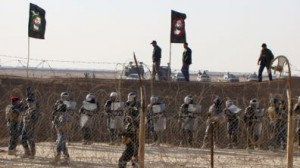FOX NEWS

Dec. 9, 2011: In this photo provided by the People's Mujahedeen Organization of Iran, Iraqi police stand guard outside the opposition group's camp northeast of Baghdad, Iraq.
The United Nations and the Iraqi government have announced that they have signed an agreement about what to do with 3,400 Iranian exiles who have been left stateless and under siege at a refugee camp in Iraq. The State Department welcomed the announcement.
“We are encouraged by the Iraqi government’s willingness to commit to this plan,” Secretary of State Hillary Clinton wrote. “Officials from U.S. Embassy Baghdad will visit regularly and frequently….At this new location, the U.N. High Commission for Refugees (UNHCR) will be able to conduct refugee status determinations for the residents of Ashraf — a necessary first step toward resettlement to third countries.”
But residents of Camp Ashraf say they fear for their lives, even though the Iraqis reportedly agreed to resettle these 3,400 Iranian exiles at Camp Liberty, the former U.S. military base near Baghdad, before helping them leave Iraq. The group is still waiting to view the signed agreement.
“The Secretary General’s Special Representative has underscored that in any event, this is a voluntary and not a forcible relocation,” said Shahin Gobadi of the National Council of Resistance of Iran, the group’s representative in Paris. “Ashraf residents had repeatedly emphasized that they would in no way accept forcible relocation.”
So who are these Iranians left stateless in Iraq and why does the U.S. have a responsibility for them?
The group known as the Mujahideen Khalq or MEK, has been based in Iraq since the 1980s.
Saddam Hussein gave them protection because they helped him fight Ayatollah Khomeini and the mullahs in Iran. Since the U.S. military toppled Saddam Hussein after the invasion in 2003, the Iranians have been urging Iraq to hand over the exiles, whom Tehran considers traitors and spies.
Technically, the MEK is still on the State Department’s Foreign Terrorist Organization list, placed there by President Bill Clinton because the group allegedly killed six American diplomats during the 1970’s when the U.S. was supporting the Shah in Tehran. The group was reportedly placed on the list at a time when the State Department was attempting to engage Iran diplomatically.
More recently, the MEK and its affiliates have also helped the U.S. and Western intelligence agencies. They provided information about the secret uranium enrichment facility in Natanz – a key intelligence breakthrough for the West.
Iran is so threatened by them that when an agreement was reported in recent days, a militia aligned with Iran’s Quds force reportedly fired Katyusha rockets at Camp Ashraf, which is located in northeastern Iraq.
Further, a bipartisan group of more than a dozen top former U.S. national security advisers have been lobbying the State Department to protect the people of Camp Ashraf. They argue that the U.S. has a moral obligation to protect the Camp Ashraf residents because the U.S. military convinced the MEK to disarm after the U.S. invasion, promising them protection and then washed its hands of the situation.
“The United States General gave a guarantee in 2003, when we invaded Iraq and they surrendered their arms, heavy arms and light arms that they could have used to defend themselves,” says former Attorney General Michael Mukasey. “We gave them a guarantee that they would be treated as protected persons.”
Fox News has obtained the July 21, 2004 letter signed by U.S. Army Major General Geoffrey Miller, Deputy Commanding General of Multi-National Forces Iraq, who wrote, “I am writing to congratulate each individual living in Camp Ashraf on their recognition as protected persons under the 4th Geneva Convention.”
Click here to read the letter from U.S. Army Major General Geoffrey Miller.
A year later Major General William Brandenburg, another MNF-I commander writes, “Coalition forces remain committed to fulfilling the humanitarian mission of ensuring that the important rights provided by the Geneva Convention …are respected at Camp Ashraf.”
According to former Homeland Security chief Tom Ridge, “We asked a group of people to disarm themselves, to give away, surrender their capability of defending themselves. And in exchange for that, we promised them, we made a commitment that we would provide for their safety and security.”
The 3,400 Iranian exiles living in Camp Ashraf worry they will be killed if left in Iraq without U.S. protection.
“This agreement has not been negotiated with the MEK,” Ridge wrote in response to a Fox query in the wake of the announced deal. “Since the U.S. has yet to lift its ‘foreign terrorist organization’ designation, many of us are concerned that the Iraqi government under the influence of Iran and even with their direct support may provoke an incident against these defenseless residents to justify another massacre. I just want to reiterate that this is NOT a negotiated arrangement and frankly, it doesn’t appear the U.S. had much influence on the outcome.”
In other words, if the State Department leaves the MEK and residents of Camp Ashraf on its terror list, even if the U.N. High Commissioner for Refugees wants to help them emigrate, no Western countries or the United States will take them.
